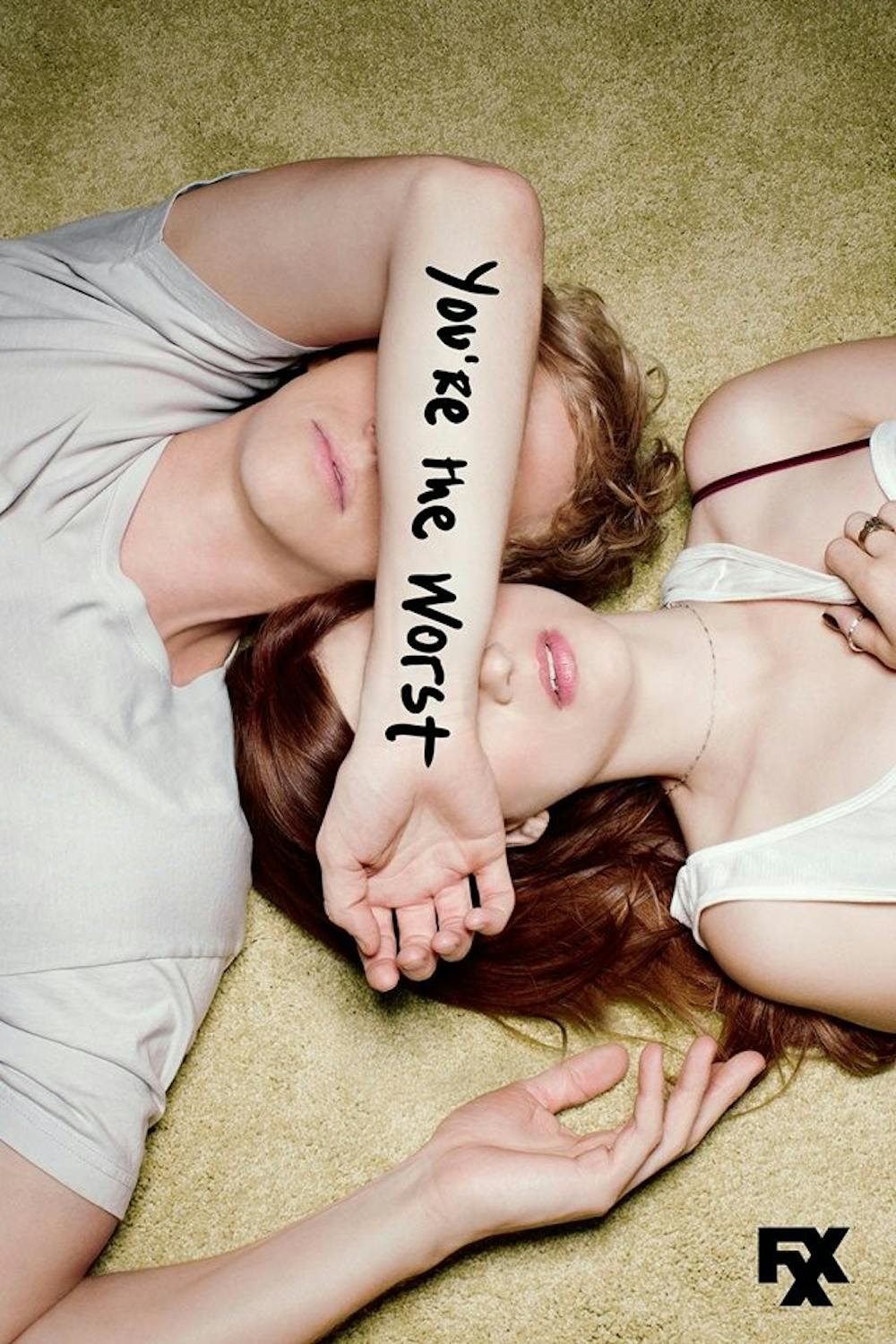As FXX's comedy, "You're The Worst," neared the midway point of its second season, it was clear that something was different.
Gretchen was acting strange.
The series, an atypical romantic comedy of sorts, follows Jimmy Shive-Overly (Chris Geere) and Gretchen Cutler (Aya Cash), two self-involved Californian millennials who don't believe in relationships and yet, decide to enter a relationship.
Gretchen has always had a unique, if not odd, personality. When we first meet her in the pilot episode, she's stealing a blender and various hors d'oeuvres from a wedding. But, as the series progresses, her actions begin to suggest that something else is at play beyond her normal quirky attitude. She's sneaking out in the middle of the night to cry in her car. Her normal party-hardy drug and alcohol consumption is approaching dangerous levels. She's spending long periods of time just laying in bed and doing nothing.
Eventually this culminates in a drunken outburst after which her friend Lindsay asks her, "It's back, isn't it?"
What is "It?" Well, as she explains to Jimmy at the end of the episode, she suffers from clinical depression.
Revealing such a massive, yet previously unmentioned storyline halfway through his show's second season was undoubtedly a major risk for showrunner Stephen Falk. However, it ended up paying off as "YTW" is now widely regarded as one of the best television shows of 2015. What sets this comedy apart from other on-screen depictions of depression is that it approaches the issue head-on and does so in an incredibly accurate manner.
Even with mental health becoming a more prominent issue in today's society (a 2014 survey from the National Survey on Drug Use and Health shows that 18.1 percent of U.S. adults suffer from a mental illness), a stigma is still associated with depression. According to the Depression and Bipolar Support Alliance, major depressive disorder affects about 14.8 million American adults, but it still is often thought of as just feeling sad or having a case of the blues. But, as Dr. Jennifer Young, a licensed psychologist and Assistant Director for Outreach & Programming at the Student Counseling Service at Miami explains, this is simply not the case.
"Depression is a serious psychological problem, not uncommon to college students," Dr. Young said. "It impairs a person's ability to function and can contribute to problems such as failing classes, loss of friendships, difficulty with self-care, and feeling as if there is no purpose to life."
Falk's writing encapsulates this clinical description perfectly. As Gretchen slips deeper and deeper into a depressive cycle, her life begins to fall apart - she loses interest in her work, she rarely leaves her house, and her relationships begin to deteriorate. Furthermore, Falk works diligently to hammer home the idea that this isn't just a moody phase and it's not caused by anything in particular; this is a part of who Gretchen is.
"You need to stop," Gretchen pleads with Jimmy after he keeps trying to "fix" her. "Every day you think things are going to be different and I'll just be happy. Well, maybe you can understand this: I feel nothing."
But Jimmy, whose stubbornness is matched only by his witty narcissism, will not stop. He sees Gretchen's illness as a challenge to overcome, and in his mind there is no challenge too tough for the great Jimmy Shive-Overly. He plans a fun day for her; he invites all of her friends over to talk her out of her rut; he suggests switching up her meds. He will stop at nothing to fix Gretchen.
Enjoy what you're reading?
Signup for our newsletter
In a way, Falk uses Jimmy to reveal what is wrong with the way we think about depression. As Young explains, this idea that there is a simple solution to such a complex problem is a common misconception.
"Oftentimes, depression is depicted as if there is a quick fix for it or that the only 'cure' is medication," she said. "Depression is very treatable but it takes time."
In a brilliant and beautiful penultimate episode, Jimmy finally grasps this. He recognizes that he can't fix Gretchen, but what he can do is simply be there for her.
"You're The Worst" is not the first story to tackle depression. Many have missed the mark, such as "Silver Linings Playbook," which made Jennifer Lawrence's character's depression out to be just another quirky personality trait and seemed to argue that true love is more effective treatment than therapy or medication.
Many, however, have been quite accurate. Shows such as "Mad Men," "BoJack Horseman," and "The Sopranos" all deal with severely depressed protagonists that defy traditional stigma. The difference is that "You're The Worst" makes the illness its central storyline. It addresses it head-on and announces that it is doing so. To the untrained eye, Don Draper and BoJack Horseman may appear to just be sullen alcoholics. But Stephen Falk and "You're The Worst" force the viewer to understand the material they are confronting.
And with mental illness affecting so many people, this creates for television that is not just entertaining, but also important.
"Pop culture plays a very large role in shaping public perception of mental health issues," Young said. "We can learn about others' experiences with depression ... and this helps decrease the stigma associated with mental health and normalize these emotions and can encourage help-seeking behavior."




